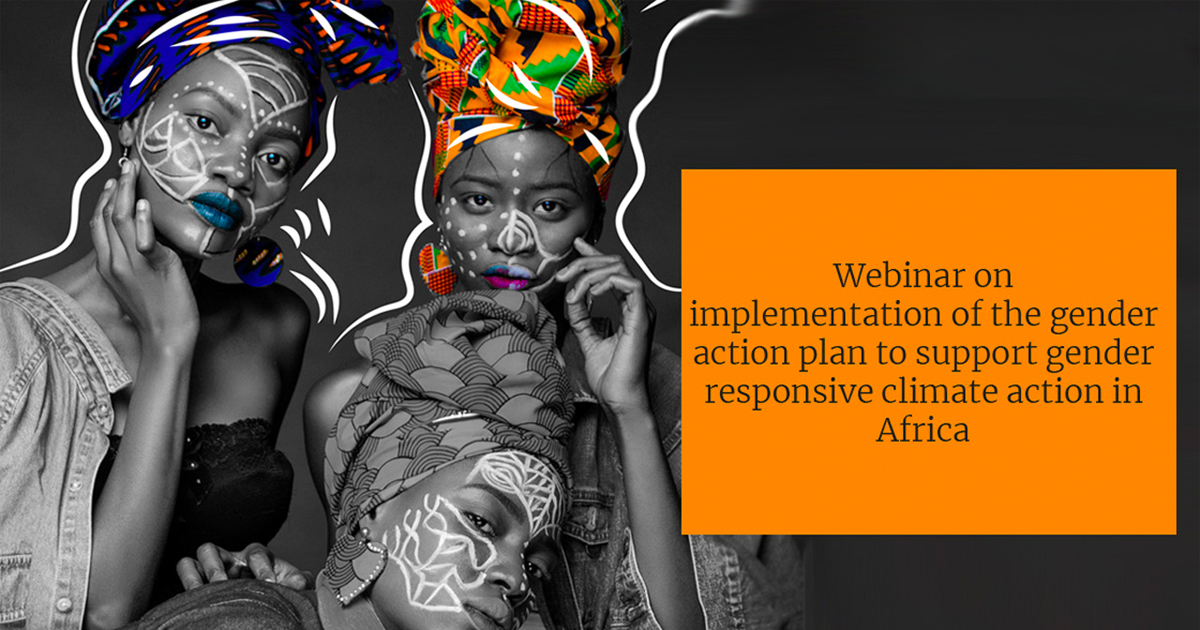The Women’s Rights Unit Clinic, Centre for Human Rights, Faculty of Law, University of Pretoria, hosted a Zoom webinar on the implementation of the Gender Action Plan (2017) to support gender-responsive climate action in Africa.
The aim of the webinar was to highlight the gendered consequences of climate disasters that impact women in Africa and create awareness of the need for the implementation of the Gender Action Plan. The webinar highlighted the role of CSOs and individuals in the implementation of the gender action plan in Africa. The work of African activists advocating for and implementing gender-just climate solutions on the continent was spotlighted in the discussion.
Giving the welcome remarks during the webinar, Mr Lloyd Kuveya, Assistant Director of the Centre for Human Rights, highlighted that the event came at an important juncture in the life of the Centre for Human Rights after the launch of the Green Justice Africa campaign. Mr. Kuveya went on to highlight that the webinar proffered a platform for an important dialogue on what can be done by parliaments, CSOs, academia, international finance institutions and other stakeholders in supporting women to mitigate the adverse effects of climate change.
Speaking on the gendered effects of climate change during the webinar, one of the panellists Olivia Adhiambo Ojwando, a policy specialist from Kenya, highlighted that women are disproportionately affected by the effects of climate change due to traditional gender roles. She highlighted that their limited access to decision making processes in tackling climate change is a gross injustice as they play a critical role in climate mitigation.
Presenting on the implementation of the UNFCCC Gender Action Plan in East Africa, Honourable Christine Kaaya from Uganda highlighted that public participation of women in climate action is lacking due to resource constraints and submitted that countries should prioritise climate financing from a gender lens. Honourable Kaaya went on to highlight that in promoting the implementation of the Gender Action Plan, climate reporting should look at the different genders and how they are affected in order for project designs to reflect a gendered response to climate change.
Honourable James Ater from South Sudan highlighted that South Sudan has ratified international frameworks on climate change including the Paris Agreement and the UNFCCC. However, he noted that the biggest challenge is implementation of the Paris Agreement and the UNFCCC and called upon the government to prioritise implementation of these frameworks so as to create platforms for women to actively take part in climate action.
Delivering a presentation on the financing of climate change response, Fazal Issa Dinmohamed from Tanzania highlighted that women are more affected by climate change due to lack of resources to adapt to climate change. He then went on to recommend that gender financing should be integrated in climate action plans and that program designs should include a gender element so that women are not left behind as envisaged by the Gender Action Plan.
Hamira Kobusingye, a climate activist from Uganda, spoke on how women climate activists can be supported and highlighted that women are affected more adversely due to climate change. She called on governments to stop prioritising profits over people by allowing activities that contribute high volumes of emissions. She also called on governments to be open to engagements with all stakeholders working on climate change so that the interests of all groups, especially women, are considered in climate action.
Delivering her presentation on climate action in Southern Africa and what can be done for women and girls, Honourable Tatenda Mavetera from Zimbabwe highlighted the need for promotion of women led solutions for sustainable climate action especially with regards to resource allocation. She further highlighted the need for a regional plan and dialogue with stakeholders in the climate change sector which will speak into women inclusion.
Speaking on the way forward and what CSOs can do, Fred Ouma from Kenya said that it is crucial for CSOs across Africa to work with relevant ministries and departments and advocate for the inclusion of a gender component in all climate response actions so as to promote the implementation of the Gender Action Plan.
The webinar was attended by Civil Society Organisations, policy makers, climate activists and students from all over Africa. This event forms part of the Women’s Rights Unit Clinic’s 2022 advocacy campaign on climate change and gender and the Centre for Human Rights’ Green Justice Africa campaign.
For more information, please contact:


